Legal and Ethical Principles in Healthcare: A Case Study Analysis
VerifiedAdded on 2023/01/16
|11
|2979
|49
Case Study
AI Summary
This case study analyzes the legal and ethical principles surrounding end-of-life decisions in healthcare, focusing on a scenario involving a patient in a vegetative state and the potential withdrawal of life support. The assignment explores the conflict between religious beliefs, scientific understanding, and patient autonomy, examining the ethical considerations of withholding or withdrawing artificial life-sustaining treatment. It discusses the legal procedures and consent issues in Australia, considering the rights and responsibilities of patients, physicians, and family members. The analysis considers the perspectives of different stakeholders, including the patient's family and healthcare providers, and examines relevant legal and ethical frameworks, such as the Universal Declaration on Bioethics and Human Rights and Queensland law. The paper highlights the complexities of balancing patient autonomy, the sanctity of life, and the legal requirements for informed consent in end-of-life care.
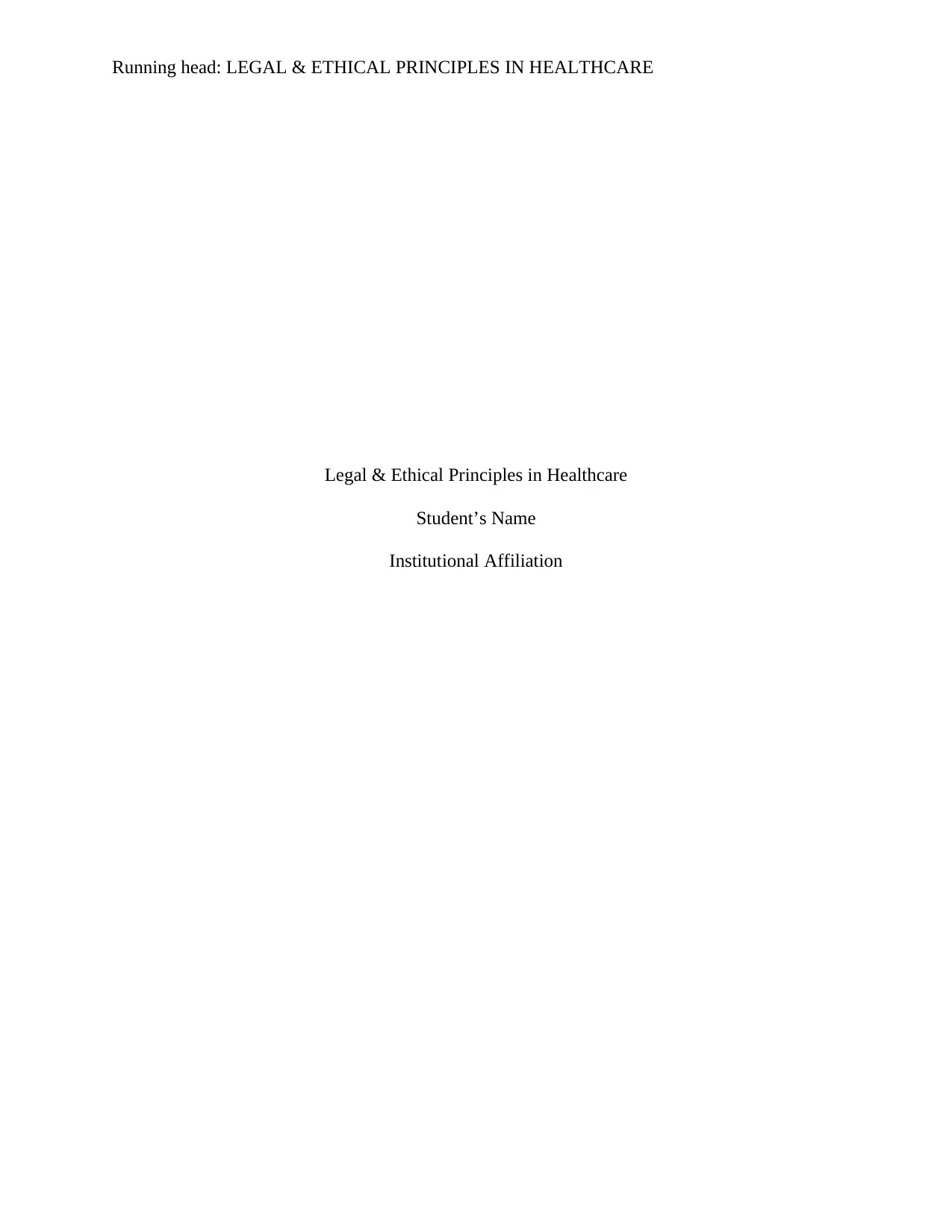
Running head: LEGAL & ETHICAL PRINCIPLES IN HEALTHCARE
Legal & Ethical Principles in Healthcare
Student’s Name
Institutional Affiliation
Legal & Ethical Principles in Healthcare
Student’s Name
Institutional Affiliation
Paraphrase This Document
Need a fresh take? Get an instant paraphrase of this document with our AI Paraphraser
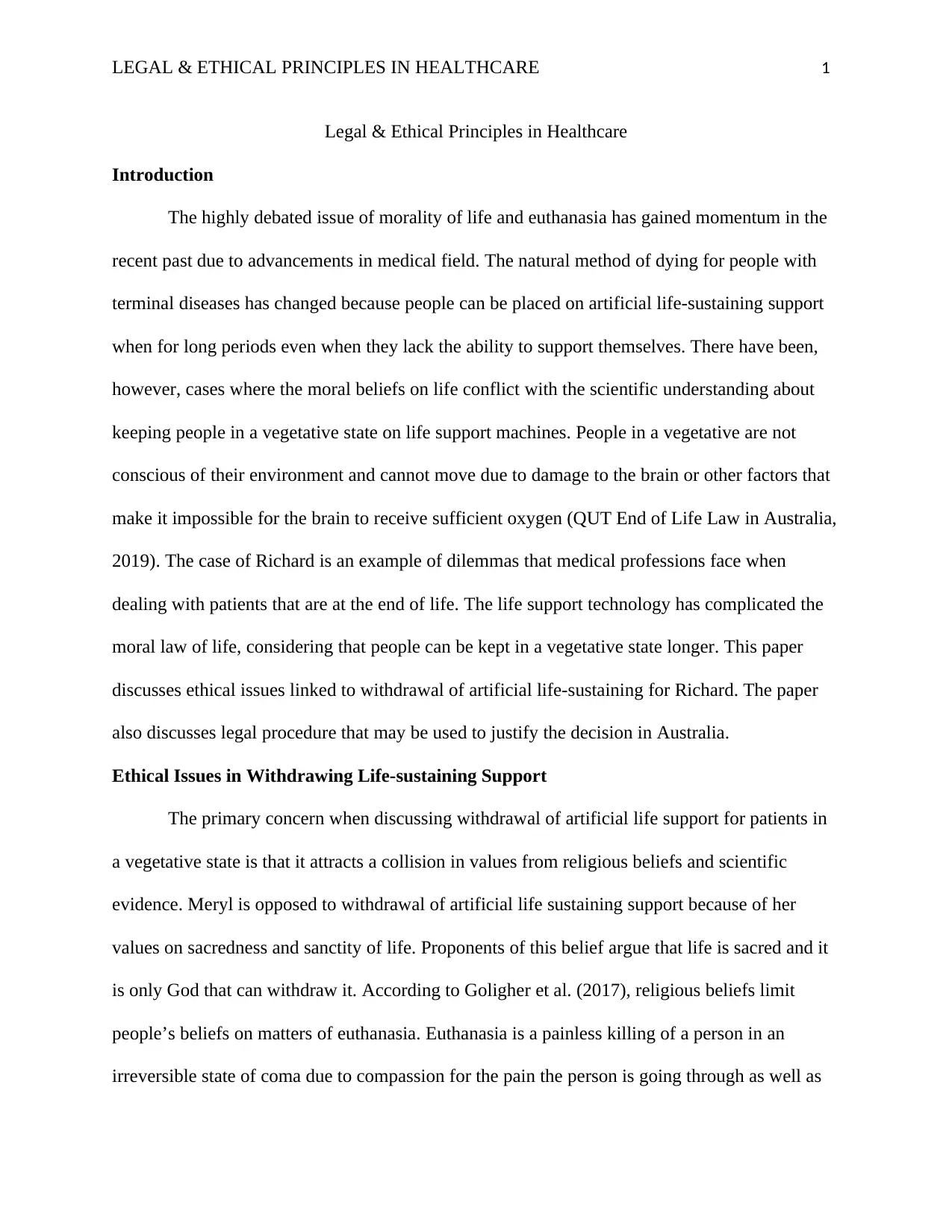
LEGAL & ETHICAL PRINCIPLES IN HEALTHCARE 1
Legal & Ethical Principles in Healthcare
Introduction
The highly debated issue of morality of life and euthanasia has gained momentum in the
recent past due to advancements in medical field. The natural method of dying for people with
terminal diseases has changed because people can be placed on artificial life-sustaining support
when for long periods even when they lack the ability to support themselves. There have been,
however, cases where the moral beliefs on life conflict with the scientific understanding about
keeping people in a vegetative state on life support machines. People in a vegetative are not
conscious of their environment and cannot move due to damage to the brain or other factors that
make it impossible for the brain to receive sufficient oxygen (QUT End of Life Law in Australia,
2019). The case of Richard is an example of dilemmas that medical professions face when
dealing with patients that are at the end of life. The life support technology has complicated the
moral law of life, considering that people can be kept in a vegetative state longer. This paper
discusses ethical issues linked to withdrawal of artificial life-sustaining for Richard. The paper
also discusses legal procedure that may be used to justify the decision in Australia.
Ethical Issues in Withdrawing Life-sustaining Support
The primary concern when discussing withdrawal of artificial life support for patients in
a vegetative state is that it attracts a collision in values from religious beliefs and scientific
evidence. Meryl is opposed to withdrawal of artificial life sustaining support because of her
values on sacredness and sanctity of life. Proponents of this belief argue that life is sacred and it
is only God that can withdraw it. According to Goligher et al. (2017), religious beliefs limit
people’s beliefs on matters of euthanasia. Euthanasia is a painless killing of a person in an
irreversible state of coma due to compassion for the pain the person is going through as well as
Legal & Ethical Principles in Healthcare
Introduction
The highly debated issue of morality of life and euthanasia has gained momentum in the
recent past due to advancements in medical field. The natural method of dying for people with
terminal diseases has changed because people can be placed on artificial life-sustaining support
when for long periods even when they lack the ability to support themselves. There have been,
however, cases where the moral beliefs on life conflict with the scientific understanding about
keeping people in a vegetative state on life support machines. People in a vegetative are not
conscious of their environment and cannot move due to damage to the brain or other factors that
make it impossible for the brain to receive sufficient oxygen (QUT End of Life Law in Australia,
2019). The case of Richard is an example of dilemmas that medical professions face when
dealing with patients that are at the end of life. The life support technology has complicated the
moral law of life, considering that people can be kept in a vegetative state longer. This paper
discusses ethical issues linked to withdrawal of artificial life-sustaining for Richard. The paper
also discusses legal procedure that may be used to justify the decision in Australia.
Ethical Issues in Withdrawing Life-sustaining Support
The primary concern when discussing withdrawal of artificial life support for patients in
a vegetative state is that it attracts a collision in values from religious beliefs and scientific
evidence. Meryl is opposed to withdrawal of artificial life sustaining support because of her
values on sacredness and sanctity of life. Proponents of this belief argue that life is sacred and it
is only God that can withdraw it. According to Goligher et al. (2017), religious beliefs limit
people’s beliefs on matters of euthanasia. Euthanasia is a painless killing of a person in an
irreversible state of coma due to compassion for the pain the person is going through as well as
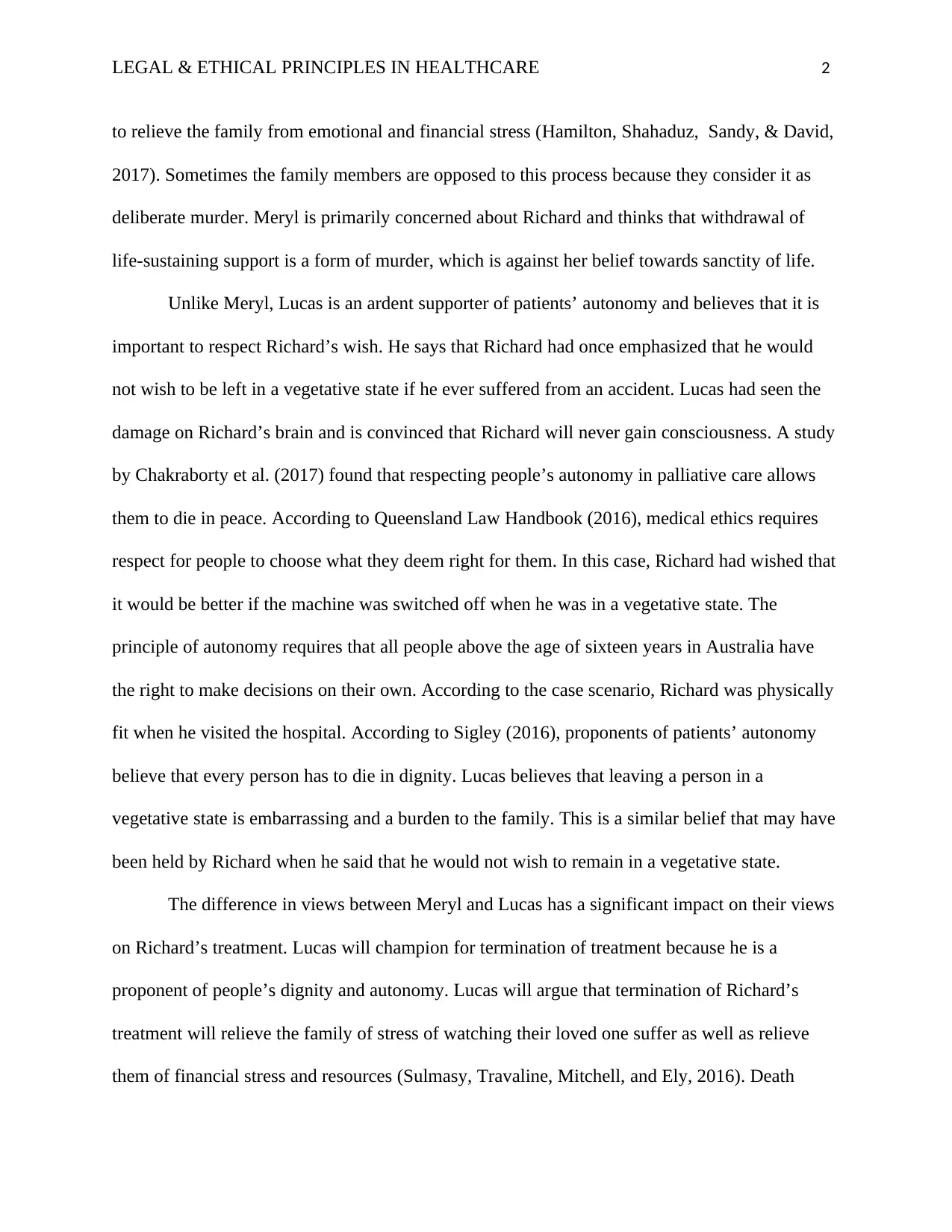
LEGAL & ETHICAL PRINCIPLES IN HEALTHCARE 2
to relieve the family from emotional and financial stress (Hamilton, Shahaduz, Sandy, & David,
2017). Sometimes the family members are opposed to this process because they consider it as
deliberate murder. Meryl is primarily concerned about Richard and thinks that withdrawal of
life-sustaining support is a form of murder, which is against her belief towards sanctity of life.
Unlike Meryl, Lucas is an ardent supporter of patients’ autonomy and believes that it is
important to respect Richard’s wish. He says that Richard had once emphasized that he would
not wish to be left in a vegetative state if he ever suffered from an accident. Lucas had seen the
damage on Richard’s brain and is convinced that Richard will never gain consciousness. A study
by Chakraborty et al. (2017) found that respecting people’s autonomy in palliative care allows
them to die in peace. According to Queensland Law Handbook (2016), medical ethics requires
respect for people to choose what they deem right for them. In this case, Richard had wished that
it would be better if the machine was switched off when he was in a vegetative state. The
principle of autonomy requires that all people above the age of sixteen years in Australia have
the right to make decisions on their own. According to the case scenario, Richard was physically
fit when he visited the hospital. According to Sigley (2016), proponents of patients’ autonomy
believe that every person has to die in dignity. Lucas believes that leaving a person in a
vegetative state is embarrassing and a burden to the family. This is a similar belief that may have
been held by Richard when he said that he would not wish to remain in a vegetative state.
The difference in views between Meryl and Lucas has a significant impact on their views
on Richard’s treatment. Lucas will champion for termination of treatment because he is a
proponent of people’s dignity and autonomy. Lucas will argue that termination of Richard’s
treatment will relieve the family of stress of watching their loved one suffer as well as relieve
them of financial stress and resources (Sulmasy, Travaline, Mitchell, and Ely, 2016). Death
to relieve the family from emotional and financial stress (Hamilton, Shahaduz, Sandy, & David,
2017). Sometimes the family members are opposed to this process because they consider it as
deliberate murder. Meryl is primarily concerned about Richard and thinks that withdrawal of
life-sustaining support is a form of murder, which is against her belief towards sanctity of life.
Unlike Meryl, Lucas is an ardent supporter of patients’ autonomy and believes that it is
important to respect Richard’s wish. He says that Richard had once emphasized that he would
not wish to be left in a vegetative state if he ever suffered from an accident. Lucas had seen the
damage on Richard’s brain and is convinced that Richard will never gain consciousness. A study
by Chakraborty et al. (2017) found that respecting people’s autonomy in palliative care allows
them to die in peace. According to Queensland Law Handbook (2016), medical ethics requires
respect for people to choose what they deem right for them. In this case, Richard had wished that
it would be better if the machine was switched off when he was in a vegetative state. The
principle of autonomy requires that all people above the age of sixteen years in Australia have
the right to make decisions on their own. According to the case scenario, Richard was physically
fit when he visited the hospital. According to Sigley (2016), proponents of patients’ autonomy
believe that every person has to die in dignity. Lucas believes that leaving a person in a
vegetative state is embarrassing and a burden to the family. This is a similar belief that may have
been held by Richard when he said that he would not wish to remain in a vegetative state.
The difference in views between Meryl and Lucas has a significant impact on their views
on Richard’s treatment. Lucas will champion for termination of treatment because he is a
proponent of people’s dignity and autonomy. Lucas will argue that termination of Richard’s
treatment will relieve the family of stress of watching their loved one suffer as well as relieve
them of financial stress and resources (Sulmasy, Travaline, Mitchell, and Ely, 2016). Death
⊘ This is a preview!⊘
Do you want full access?
Subscribe today to unlock all pages.

Trusted by 1+ million students worldwide
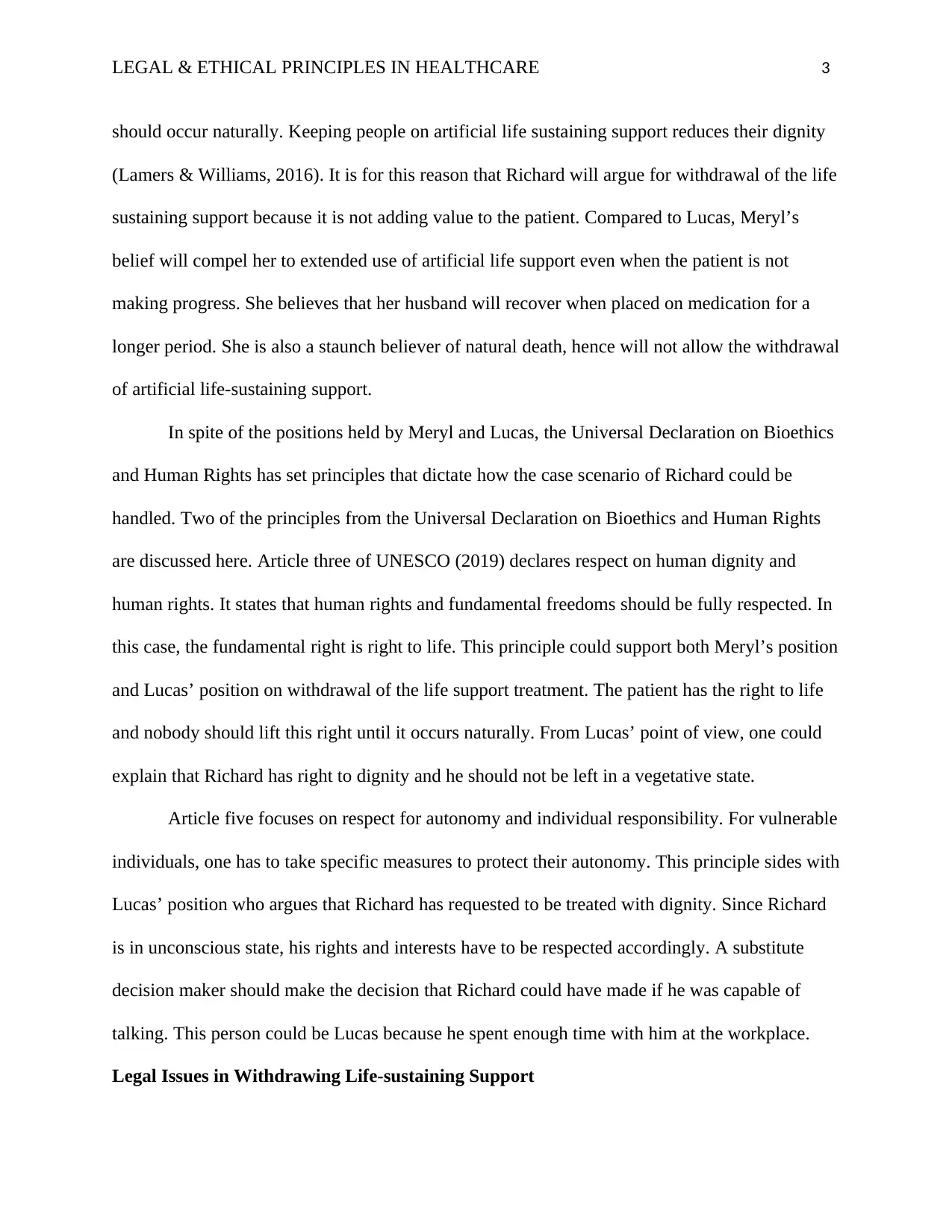
LEGAL & ETHICAL PRINCIPLES IN HEALTHCARE 3
should occur naturally. Keeping people on artificial life sustaining support reduces their dignity
(Lamers & Williams, 2016). It is for this reason that Richard will argue for withdrawal of the life
sustaining support because it is not adding value to the patient. Compared to Lucas, Meryl’s
belief will compel her to extended use of artificial life support even when the patient is not
making progress. She believes that her husband will recover when placed on medication for a
longer period. She is also a staunch believer of natural death, hence will not allow the withdrawal
of artificial life-sustaining support.
In spite of the positions held by Meryl and Lucas, the Universal Declaration on Bioethics
and Human Rights has set principles that dictate how the case scenario of Richard could be
handled. Two of the principles from the Universal Declaration on Bioethics and Human Rights
are discussed here. Article three of UNESCO (2019) declares respect on human dignity and
human rights. It states that human rights and fundamental freedoms should be fully respected. In
this case, the fundamental right is right to life. This principle could support both Meryl’s position
and Lucas’ position on withdrawal of the life support treatment. The patient has the right to life
and nobody should lift this right until it occurs naturally. From Lucas’ point of view, one could
explain that Richard has right to dignity and he should not be left in a vegetative state.
Article five focuses on respect for autonomy and individual responsibility. For vulnerable
individuals, one has to take specific measures to protect their autonomy. This principle sides with
Lucas’ position who argues that Richard has requested to be treated with dignity. Since Richard
is in unconscious state, his rights and interests have to be respected accordingly. A substitute
decision maker should make the decision that Richard could have made if he was capable of
talking. This person could be Lucas because he spent enough time with him at the workplace.
Legal Issues in Withdrawing Life-sustaining Support
should occur naturally. Keeping people on artificial life sustaining support reduces their dignity
(Lamers & Williams, 2016). It is for this reason that Richard will argue for withdrawal of the life
sustaining support because it is not adding value to the patient. Compared to Lucas, Meryl’s
belief will compel her to extended use of artificial life support even when the patient is not
making progress. She believes that her husband will recover when placed on medication for a
longer period. She is also a staunch believer of natural death, hence will not allow the withdrawal
of artificial life-sustaining support.
In spite of the positions held by Meryl and Lucas, the Universal Declaration on Bioethics
and Human Rights has set principles that dictate how the case scenario of Richard could be
handled. Two of the principles from the Universal Declaration on Bioethics and Human Rights
are discussed here. Article three of UNESCO (2019) declares respect on human dignity and
human rights. It states that human rights and fundamental freedoms should be fully respected. In
this case, the fundamental right is right to life. This principle could support both Meryl’s position
and Lucas’ position on withdrawal of the life support treatment. The patient has the right to life
and nobody should lift this right until it occurs naturally. From Lucas’ point of view, one could
explain that Richard has right to dignity and he should not be left in a vegetative state.
Article five focuses on respect for autonomy and individual responsibility. For vulnerable
individuals, one has to take specific measures to protect their autonomy. This principle sides with
Lucas’ position who argues that Richard has requested to be treated with dignity. Since Richard
is in unconscious state, his rights and interests have to be respected accordingly. A substitute
decision maker should make the decision that Richard could have made if he was capable of
talking. This person could be Lucas because he spent enough time with him at the workplace.
Legal Issues in Withdrawing Life-sustaining Support
Paraphrase This Document
Need a fresh take? Get an instant paraphrase of this document with our AI Paraphraser
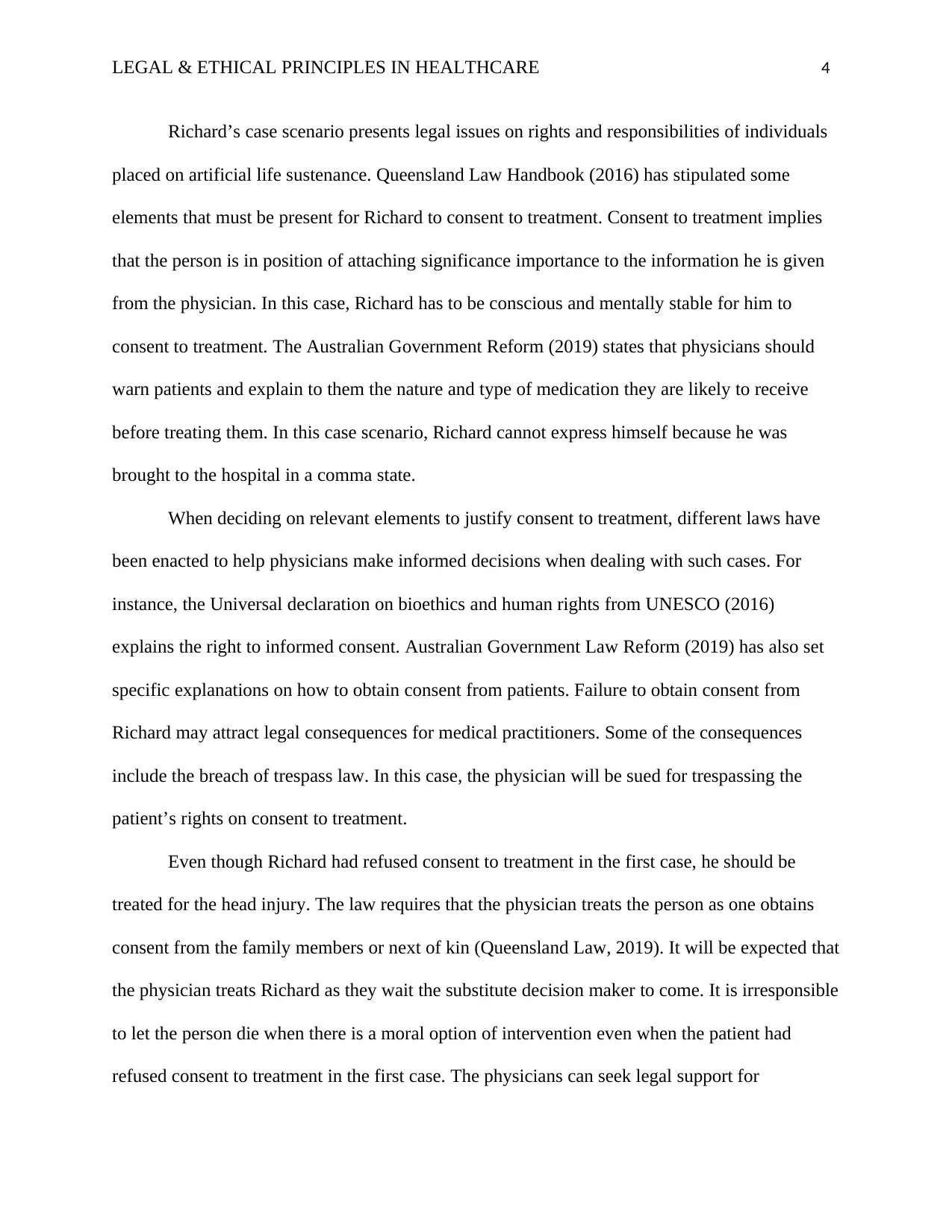
LEGAL & ETHICAL PRINCIPLES IN HEALTHCARE 4
Richard’s case scenario presents legal issues on rights and responsibilities of individuals
placed on artificial life sustenance. Queensland Law Handbook (2016) has stipulated some
elements that must be present for Richard to consent to treatment. Consent to treatment implies
that the person is in position of attaching significance importance to the information he is given
from the physician. In this case, Richard has to be conscious and mentally stable for him to
consent to treatment. The Australian Government Reform (2019) states that physicians should
warn patients and explain to them the nature and type of medication they are likely to receive
before treating them. In this case scenario, Richard cannot express himself because he was
brought to the hospital in a comma state.
When deciding on relevant elements to justify consent to treatment, different laws have
been enacted to help physicians make informed decisions when dealing with such cases. For
instance, the Universal declaration on bioethics and human rights from UNESCO (2016)
explains the right to informed consent. Australian Government Law Reform (2019) has also set
specific explanations on how to obtain consent from patients. Failure to obtain consent from
Richard may attract legal consequences for medical practitioners. Some of the consequences
include the breach of trespass law. In this case, the physician will be sued for trespassing the
patient’s rights on consent to treatment.
Even though Richard had refused consent to treatment in the first case, he should be
treated for the head injury. The law requires that the physician treats the person as one obtains
consent from the family members or next of kin (Queensland Law, 2019). It will be expected that
the physician treats Richard as they wait the substitute decision maker to come. It is irresponsible
to let the person die when there is a moral option of intervention even when the patient had
refused consent to treatment in the first case. The physicians can seek legal support for
Richard’s case scenario presents legal issues on rights and responsibilities of individuals
placed on artificial life sustenance. Queensland Law Handbook (2016) has stipulated some
elements that must be present for Richard to consent to treatment. Consent to treatment implies
that the person is in position of attaching significance importance to the information he is given
from the physician. In this case, Richard has to be conscious and mentally stable for him to
consent to treatment. The Australian Government Reform (2019) states that physicians should
warn patients and explain to them the nature and type of medication they are likely to receive
before treating them. In this case scenario, Richard cannot express himself because he was
brought to the hospital in a comma state.
When deciding on relevant elements to justify consent to treatment, different laws have
been enacted to help physicians make informed decisions when dealing with such cases. For
instance, the Universal declaration on bioethics and human rights from UNESCO (2016)
explains the right to informed consent. Australian Government Law Reform (2019) has also set
specific explanations on how to obtain consent from patients. Failure to obtain consent from
Richard may attract legal consequences for medical practitioners. Some of the consequences
include the breach of trespass law. In this case, the physician will be sued for trespassing the
patient’s rights on consent to treatment.
Even though Richard had refused consent to treatment in the first case, he should be
treated for the head injury. The law requires that the physician treats the person as one obtains
consent from the family members or next of kin (Queensland Law, 2019). It will be expected that
the physician treats Richard as they wait the substitute decision maker to come. It is irresponsible
to let the person die when there is a moral option of intervention even when the patient had
refused consent to treatment in the first case. The physicians can seek legal support for
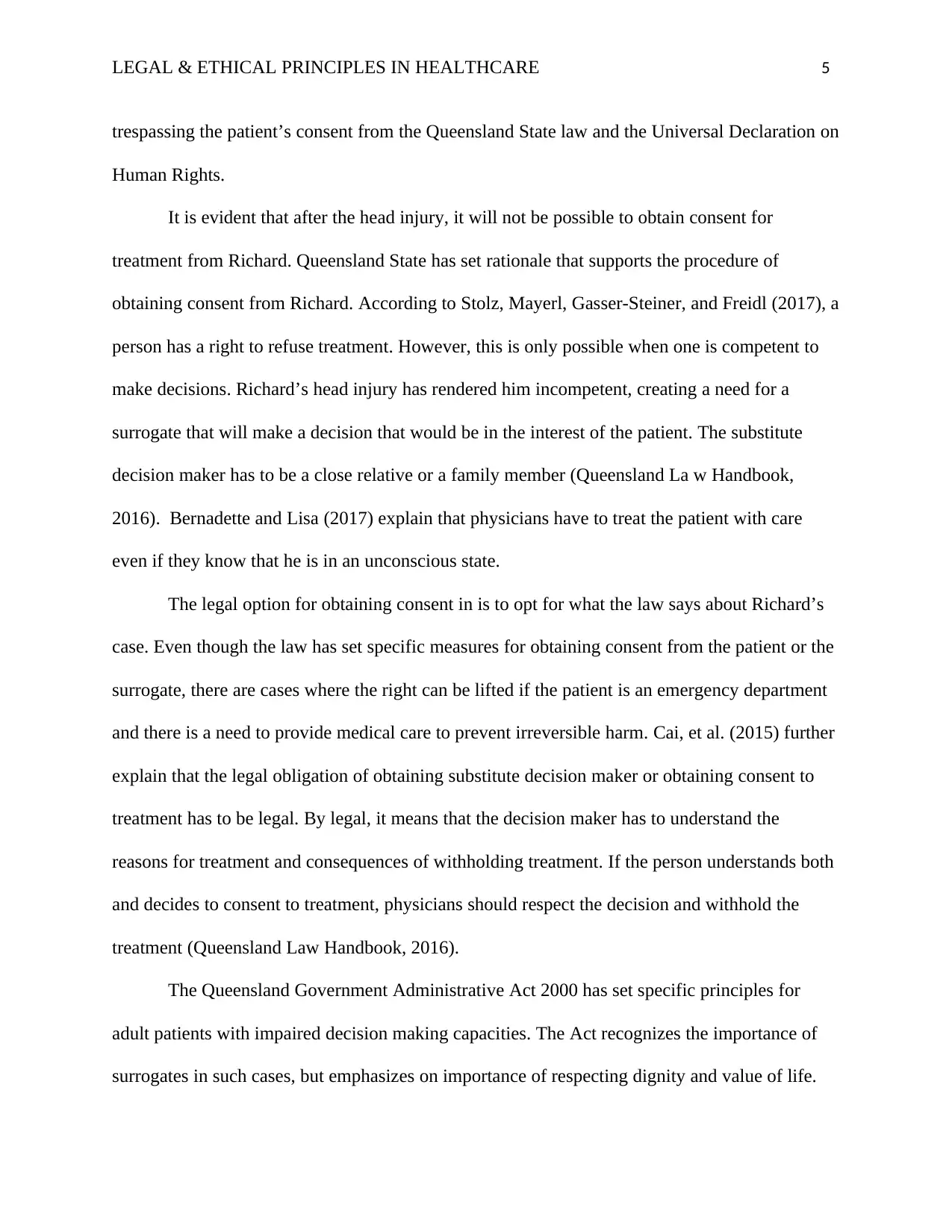
LEGAL & ETHICAL PRINCIPLES IN HEALTHCARE 5
trespassing the patient’s consent from the Queensland State law and the Universal Declaration on
Human Rights.
It is evident that after the head injury, it will not be possible to obtain consent for
treatment from Richard. Queensland State has set rationale that supports the procedure of
obtaining consent from Richard. According to Stolz, Mayerl, Gasser-Steiner, and Freidl (2017), a
person has a right to refuse treatment. However, this is only possible when one is competent to
make decisions. Richard’s head injury has rendered him incompetent, creating a need for a
surrogate that will make a decision that would be in the interest of the patient. The substitute
decision maker has to be a close relative or a family member (Queensland La w Handbook,
2016). Bernadette and Lisa (2017) explain that physicians have to treat the patient with care
even if they know that he is in an unconscious state.
The legal option for obtaining consent in is to opt for what the law says about Richard’s
case. Even though the law has set specific measures for obtaining consent from the patient or the
surrogate, there are cases where the right can be lifted if the patient is an emergency department
and there is a need to provide medical care to prevent irreversible harm. Cai, et al. (2015) further
explain that the legal obligation of obtaining substitute decision maker or obtaining consent to
treatment has to be legal. By legal, it means that the decision maker has to understand the
reasons for treatment and consequences of withholding treatment. If the person understands both
and decides to consent to treatment, physicians should respect the decision and withhold the
treatment (Queensland Law Handbook, 2016).
The Queensland Government Administrative Act 2000 has set specific principles for
adult patients with impaired decision making capacities. The Act recognizes the importance of
surrogates in such cases, but emphasizes on importance of respecting dignity and value of life.
trespassing the patient’s consent from the Queensland State law and the Universal Declaration on
Human Rights.
It is evident that after the head injury, it will not be possible to obtain consent for
treatment from Richard. Queensland State has set rationale that supports the procedure of
obtaining consent from Richard. According to Stolz, Mayerl, Gasser-Steiner, and Freidl (2017), a
person has a right to refuse treatment. However, this is only possible when one is competent to
make decisions. Richard’s head injury has rendered him incompetent, creating a need for a
surrogate that will make a decision that would be in the interest of the patient. The substitute
decision maker has to be a close relative or a family member (Queensland La w Handbook,
2016). Bernadette and Lisa (2017) explain that physicians have to treat the patient with care
even if they know that he is in an unconscious state.
The legal option for obtaining consent in is to opt for what the law says about Richard’s
case. Even though the law has set specific measures for obtaining consent from the patient or the
surrogate, there are cases where the right can be lifted if the patient is an emergency department
and there is a need to provide medical care to prevent irreversible harm. Cai, et al. (2015) further
explain that the legal obligation of obtaining substitute decision maker or obtaining consent to
treatment has to be legal. By legal, it means that the decision maker has to understand the
reasons for treatment and consequences of withholding treatment. If the person understands both
and decides to consent to treatment, physicians should respect the decision and withhold the
treatment (Queensland Law Handbook, 2016).
The Queensland Government Administrative Act 2000 has set specific principles for
adult patients with impaired decision making capacities. The Act recognizes the importance of
surrogates in such cases, but emphasizes on importance of respecting dignity and value of life.
⊘ This is a preview!⊘
Do you want full access?
Subscribe today to unlock all pages.

Trusted by 1+ million students worldwide
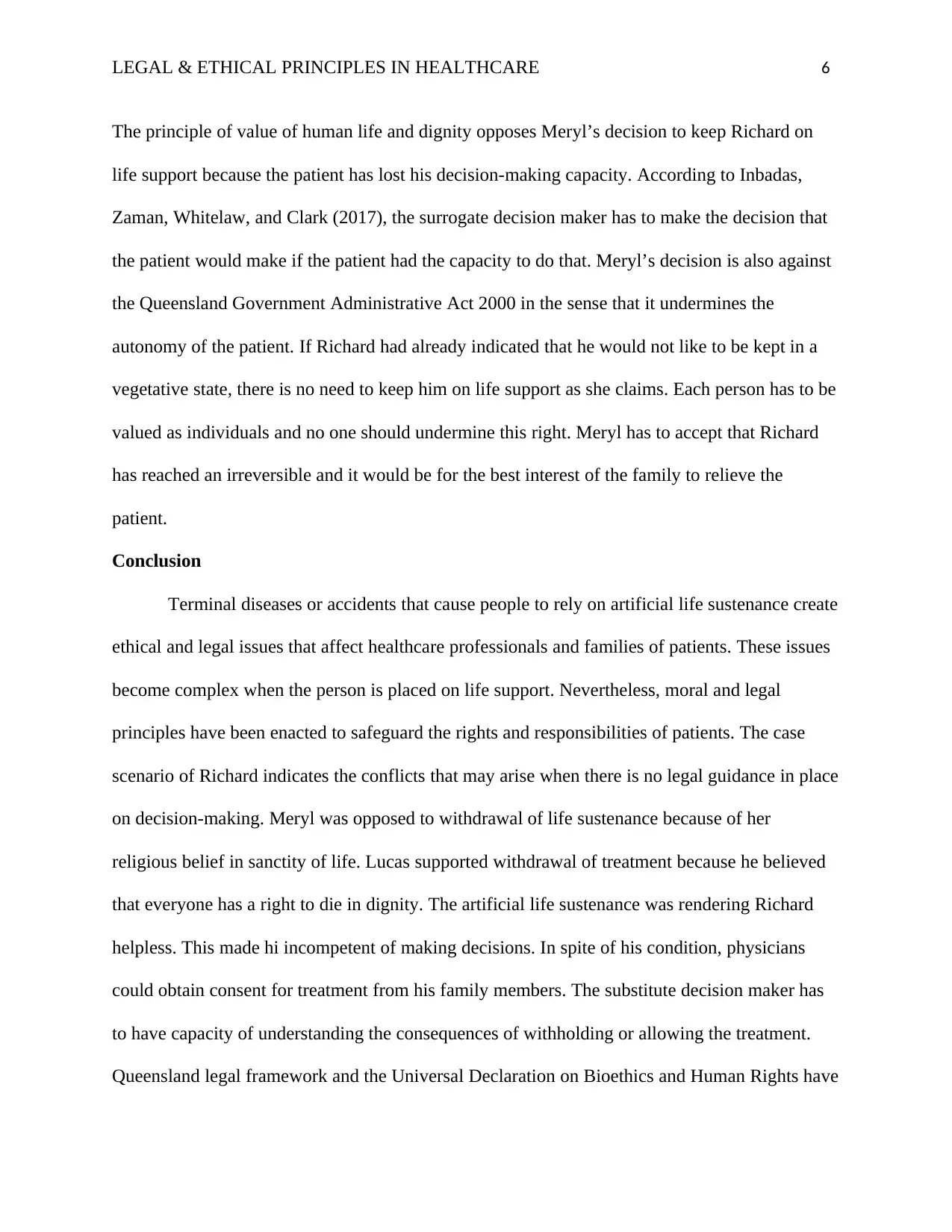
LEGAL & ETHICAL PRINCIPLES IN HEALTHCARE 6
The principle of value of human life and dignity opposes Meryl’s decision to keep Richard on
life support because the patient has lost his decision-making capacity. According to Inbadas,
Zaman, Whitelaw, and Clark (2017), the surrogate decision maker has to make the decision that
the patient would make if the patient had the capacity to do that. Meryl’s decision is also against
the Queensland Government Administrative Act 2000 in the sense that it undermines the
autonomy of the patient. If Richard had already indicated that he would not like to be kept in a
vegetative state, there is no need to keep him on life support as she claims. Each person has to be
valued as individuals and no one should undermine this right. Meryl has to accept that Richard
has reached an irreversible and it would be for the best interest of the family to relieve the
patient.
Conclusion
Terminal diseases or accidents that cause people to rely on artificial life sustenance create
ethical and legal issues that affect healthcare professionals and families of patients. These issues
become complex when the person is placed on life support. Nevertheless, moral and legal
principles have been enacted to safeguard the rights and responsibilities of patients. The case
scenario of Richard indicates the conflicts that may arise when there is no legal guidance in place
on decision-making. Meryl was opposed to withdrawal of life sustenance because of her
religious belief in sanctity of life. Lucas supported withdrawal of treatment because he believed
that everyone has a right to die in dignity. The artificial life sustenance was rendering Richard
helpless. This made hi incompetent of making decisions. In spite of his condition, physicians
could obtain consent for treatment from his family members. The substitute decision maker has
to have capacity of understanding the consequences of withholding or allowing the treatment.
Queensland legal framework and the Universal Declaration on Bioethics and Human Rights have
The principle of value of human life and dignity opposes Meryl’s decision to keep Richard on
life support because the patient has lost his decision-making capacity. According to Inbadas,
Zaman, Whitelaw, and Clark (2017), the surrogate decision maker has to make the decision that
the patient would make if the patient had the capacity to do that. Meryl’s decision is also against
the Queensland Government Administrative Act 2000 in the sense that it undermines the
autonomy of the patient. If Richard had already indicated that he would not like to be kept in a
vegetative state, there is no need to keep him on life support as she claims. Each person has to be
valued as individuals and no one should undermine this right. Meryl has to accept that Richard
has reached an irreversible and it would be for the best interest of the family to relieve the
patient.
Conclusion
Terminal diseases or accidents that cause people to rely on artificial life sustenance create
ethical and legal issues that affect healthcare professionals and families of patients. These issues
become complex when the person is placed on life support. Nevertheless, moral and legal
principles have been enacted to safeguard the rights and responsibilities of patients. The case
scenario of Richard indicates the conflicts that may arise when there is no legal guidance in place
on decision-making. Meryl was opposed to withdrawal of life sustenance because of her
religious belief in sanctity of life. Lucas supported withdrawal of treatment because he believed
that everyone has a right to die in dignity. The artificial life sustenance was rendering Richard
helpless. This made hi incompetent of making decisions. In spite of his condition, physicians
could obtain consent for treatment from his family members. The substitute decision maker has
to have capacity of understanding the consequences of withholding or allowing the treatment.
Queensland legal framework and the Universal Declaration on Bioethics and Human Rights have
Paraphrase This Document
Need a fresh take? Get an instant paraphrase of this document with our AI Paraphraser
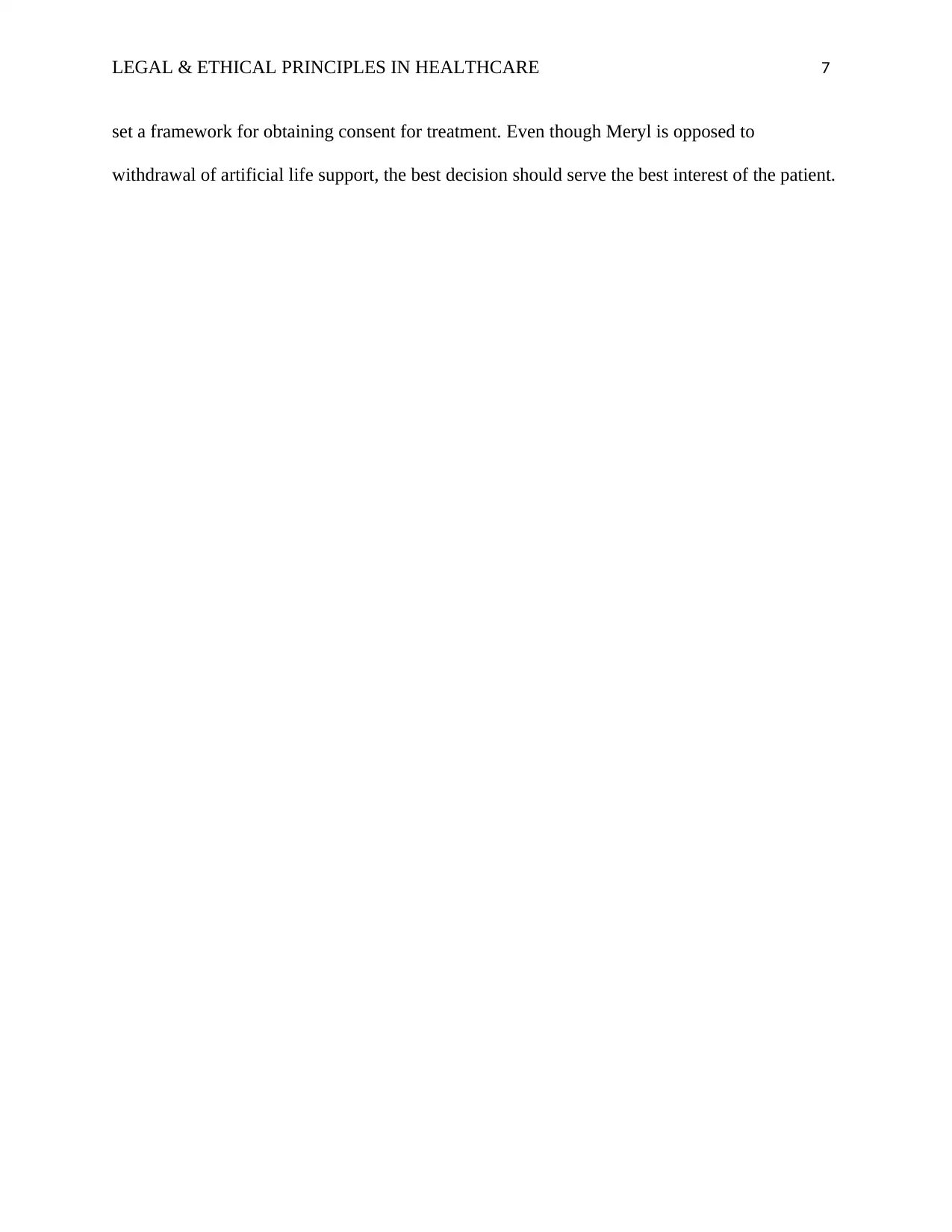
LEGAL & ETHICAL PRINCIPLES IN HEALTHCARE 7
set a framework for obtaining consent for treatment. Even though Meryl is opposed to
withdrawal of artificial life support, the best decision should serve the best interest of the patient.
set a framework for obtaining consent for treatment. Even though Meryl is opposed to
withdrawal of artificial life support, the best decision should serve the best interest of the patient.
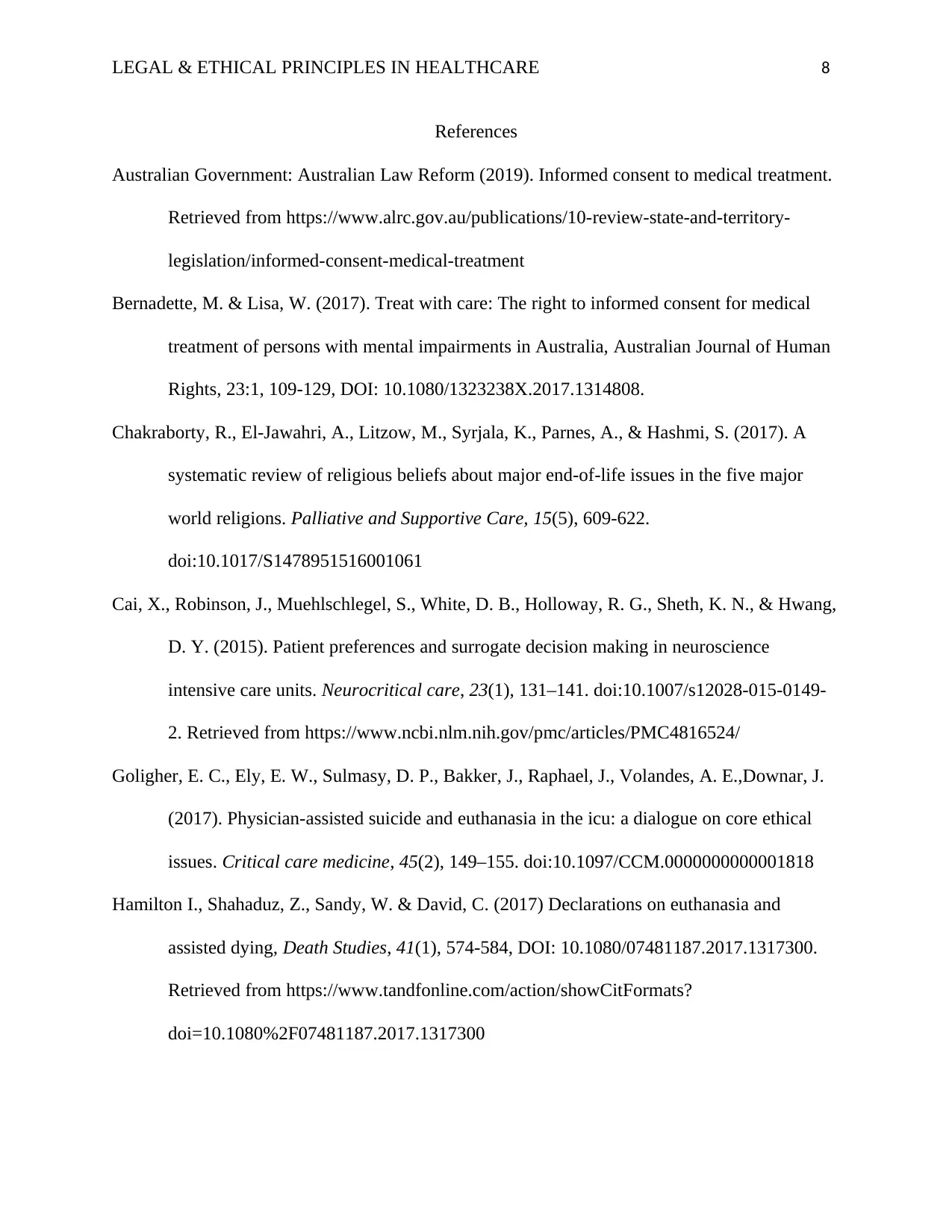
LEGAL & ETHICAL PRINCIPLES IN HEALTHCARE 8
References
Australian Government: Australian Law Reform (2019). Informed consent to medical treatment.
Retrieved from https://www.alrc.gov.au/publications/10-review-state-and-territory-
legislation/informed-consent-medical-treatment
Bernadette, M. & Lisa, W. (2017). Treat with care: The right to informed consent for medical
treatment of persons with mental impairments in Australia, Australian Journal of Human
Rights, 23:1, 109-129, DOI: 10.1080/1323238X.2017.1314808.
Chakraborty, R., El-Jawahri, A., Litzow, M., Syrjala, K., Parnes, A., & Hashmi, S. (2017). A
systematic review of religious beliefs about major end-of-life issues in the five major
world religions. Palliative and Supportive Care, 15(5), 609-622.
doi:10.1017/S1478951516001061
Cai, X., Robinson, J., Muehlschlegel, S., White, D. B., Holloway, R. G., Sheth, K. N., & Hwang,
D. Y. (2015). Patient preferences and surrogate decision making in neuroscience
intensive care units. Neurocritical care, 23(1), 131–141. doi:10.1007/s12028-015-0149-
2. Retrieved from https://www.ncbi.nlm.nih.gov/pmc/articles/PMC4816524/
Goligher, E. C., Ely, E. W., Sulmasy, D. P., Bakker, J., Raphael, J., Volandes, A. E.,Downar, J.
(2017). Physician-assisted suicide and euthanasia in the icu: a dialogue on core ethical
issues. Critical care medicine, 45(2), 149–155. doi:10.1097/CCM.0000000000001818
Hamilton I., Shahaduz, Z., Sandy, W. & David, C. (2017) Declarations on euthanasia and
assisted dying, Death Studies, 41(1), 574-584, DOI: 10.1080/07481187.2017.1317300.
Retrieved from https://www.tandfonline.com/action/showCitFormats?
doi=10.1080%2F07481187.2017.1317300
References
Australian Government: Australian Law Reform (2019). Informed consent to medical treatment.
Retrieved from https://www.alrc.gov.au/publications/10-review-state-and-territory-
legislation/informed-consent-medical-treatment
Bernadette, M. & Lisa, W. (2017). Treat with care: The right to informed consent for medical
treatment of persons with mental impairments in Australia, Australian Journal of Human
Rights, 23:1, 109-129, DOI: 10.1080/1323238X.2017.1314808.
Chakraborty, R., El-Jawahri, A., Litzow, M., Syrjala, K., Parnes, A., & Hashmi, S. (2017). A
systematic review of religious beliefs about major end-of-life issues in the five major
world religions. Palliative and Supportive Care, 15(5), 609-622.
doi:10.1017/S1478951516001061
Cai, X., Robinson, J., Muehlschlegel, S., White, D. B., Holloway, R. G., Sheth, K. N., & Hwang,
D. Y. (2015). Patient preferences and surrogate decision making in neuroscience
intensive care units. Neurocritical care, 23(1), 131–141. doi:10.1007/s12028-015-0149-
2. Retrieved from https://www.ncbi.nlm.nih.gov/pmc/articles/PMC4816524/
Goligher, E. C., Ely, E. W., Sulmasy, D. P., Bakker, J., Raphael, J., Volandes, A. E.,Downar, J.
(2017). Physician-assisted suicide and euthanasia in the icu: a dialogue on core ethical
issues. Critical care medicine, 45(2), 149–155. doi:10.1097/CCM.0000000000001818
Hamilton I., Shahaduz, Z., Sandy, W. & David, C. (2017) Declarations on euthanasia and
assisted dying, Death Studies, 41(1), 574-584, DOI: 10.1080/07481187.2017.1317300.
Retrieved from https://www.tandfonline.com/action/showCitFormats?
doi=10.1080%2F07481187.2017.1317300
⊘ This is a preview!⊘
Do you want full access?
Subscribe today to unlock all pages.

Trusted by 1+ million students worldwide
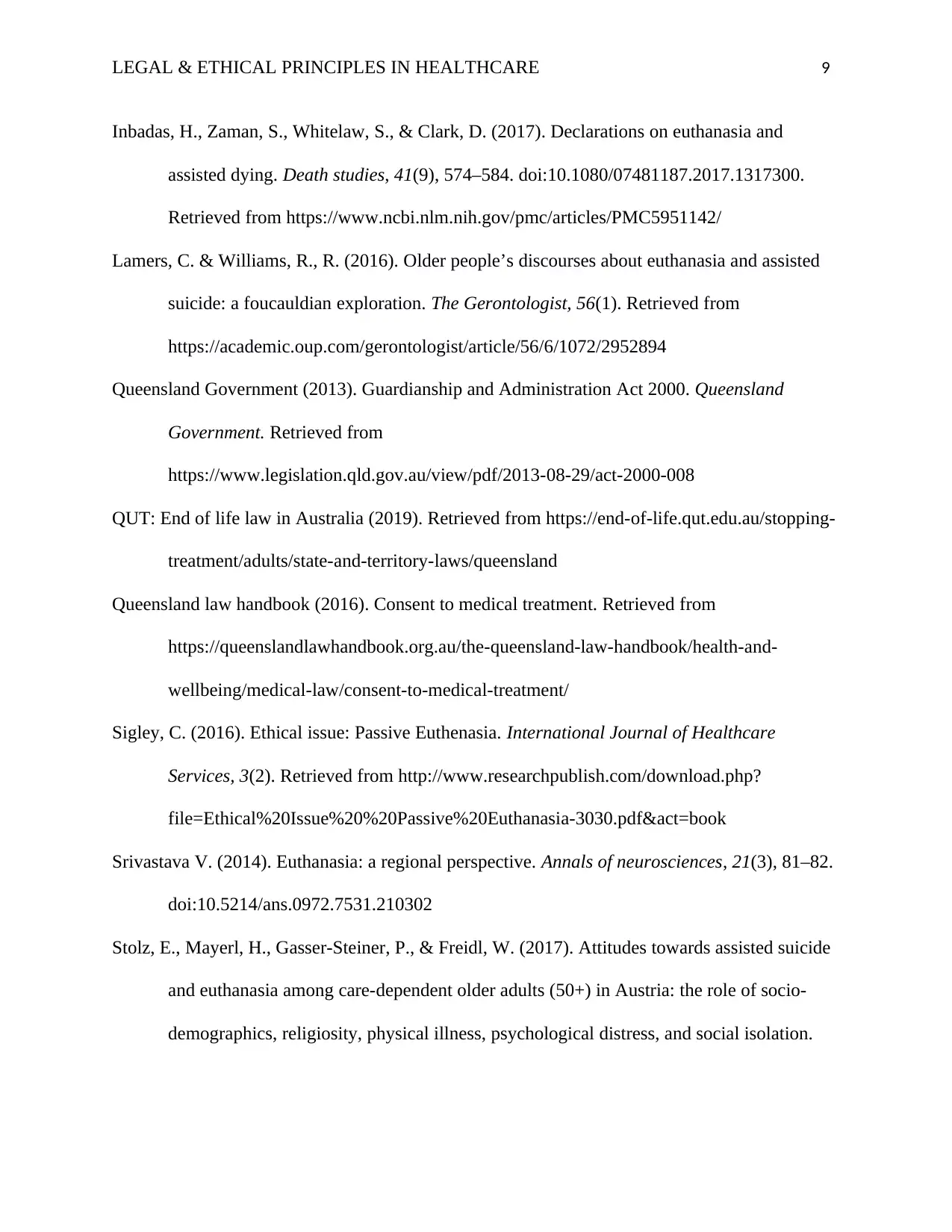
LEGAL & ETHICAL PRINCIPLES IN HEALTHCARE 9
Inbadas, H., Zaman, S., Whitelaw, S., & Clark, D. (2017). Declarations on euthanasia and
assisted dying. Death studies, 41(9), 574–584. doi:10.1080/07481187.2017.1317300.
Retrieved from https://www.ncbi.nlm.nih.gov/pmc/articles/PMC5951142/
Lamers, C. & Williams, R., R. (2016). Older people’s discourses about euthanasia and assisted
suicide: a foucauldian exploration. The Gerontologist, 56(1). Retrieved from
https://academic.oup.com/gerontologist/article/56/6/1072/2952894
Queensland Government (2013). Guardianship and Administration Act 2000. Queensland
Government. Retrieved from
https://www.legislation.qld.gov.au/view/pdf/2013-08-29/act-2000-008
QUT: End of life law in Australia (2019). Retrieved from https://end-of-life.qut.edu.au/stopping-
treatment/adults/state-and-territory-laws/queensland
Queensland law handbook (2016). Consent to medical treatment. Retrieved from
https://queenslandlawhandbook.org.au/the-queensland-law-handbook/health-and-
wellbeing/medical-law/consent-to-medical-treatment/
Sigley, C. (2016). Ethical issue: Passive Euthenasia. International Journal of Healthcare
Services, 3(2). Retrieved from http://www.researchpublish.com/download.php?
file=Ethical%20Issue%20%20Passive%20Euthanasia-3030.pdf&act=book
Srivastava V. (2014). Euthanasia: a regional perspective. Annals of neurosciences, 21(3), 81–82.
doi:10.5214/ans.0972.7531.210302
Stolz, E., Mayerl, H., Gasser-Steiner, P., & Freidl, W. (2017). Attitudes towards assisted suicide
and euthanasia among care-dependent older adults (50+) in Austria: the role of socio-
demographics, religiosity, physical illness, psychological distress, and social isolation.
Inbadas, H., Zaman, S., Whitelaw, S., & Clark, D. (2017). Declarations on euthanasia and
assisted dying. Death studies, 41(9), 574–584. doi:10.1080/07481187.2017.1317300.
Retrieved from https://www.ncbi.nlm.nih.gov/pmc/articles/PMC5951142/
Lamers, C. & Williams, R., R. (2016). Older people’s discourses about euthanasia and assisted
suicide: a foucauldian exploration. The Gerontologist, 56(1). Retrieved from
https://academic.oup.com/gerontologist/article/56/6/1072/2952894
Queensland Government (2013). Guardianship and Administration Act 2000. Queensland
Government. Retrieved from
https://www.legislation.qld.gov.au/view/pdf/2013-08-29/act-2000-008
QUT: End of life law in Australia (2019). Retrieved from https://end-of-life.qut.edu.au/stopping-
treatment/adults/state-and-territory-laws/queensland
Queensland law handbook (2016). Consent to medical treatment. Retrieved from
https://queenslandlawhandbook.org.au/the-queensland-law-handbook/health-and-
wellbeing/medical-law/consent-to-medical-treatment/
Sigley, C. (2016). Ethical issue: Passive Euthenasia. International Journal of Healthcare
Services, 3(2). Retrieved from http://www.researchpublish.com/download.php?
file=Ethical%20Issue%20%20Passive%20Euthanasia-3030.pdf&act=book
Srivastava V. (2014). Euthanasia: a regional perspective. Annals of neurosciences, 21(3), 81–82.
doi:10.5214/ans.0972.7531.210302
Stolz, E., Mayerl, H., Gasser-Steiner, P., & Freidl, W. (2017). Attitudes towards assisted suicide
and euthanasia among care-dependent older adults (50+) in Austria: the role of socio-
demographics, religiosity, physical illness, psychological distress, and social isolation.
Paraphrase This Document
Need a fresh take? Get an instant paraphrase of this document with our AI Paraphraser
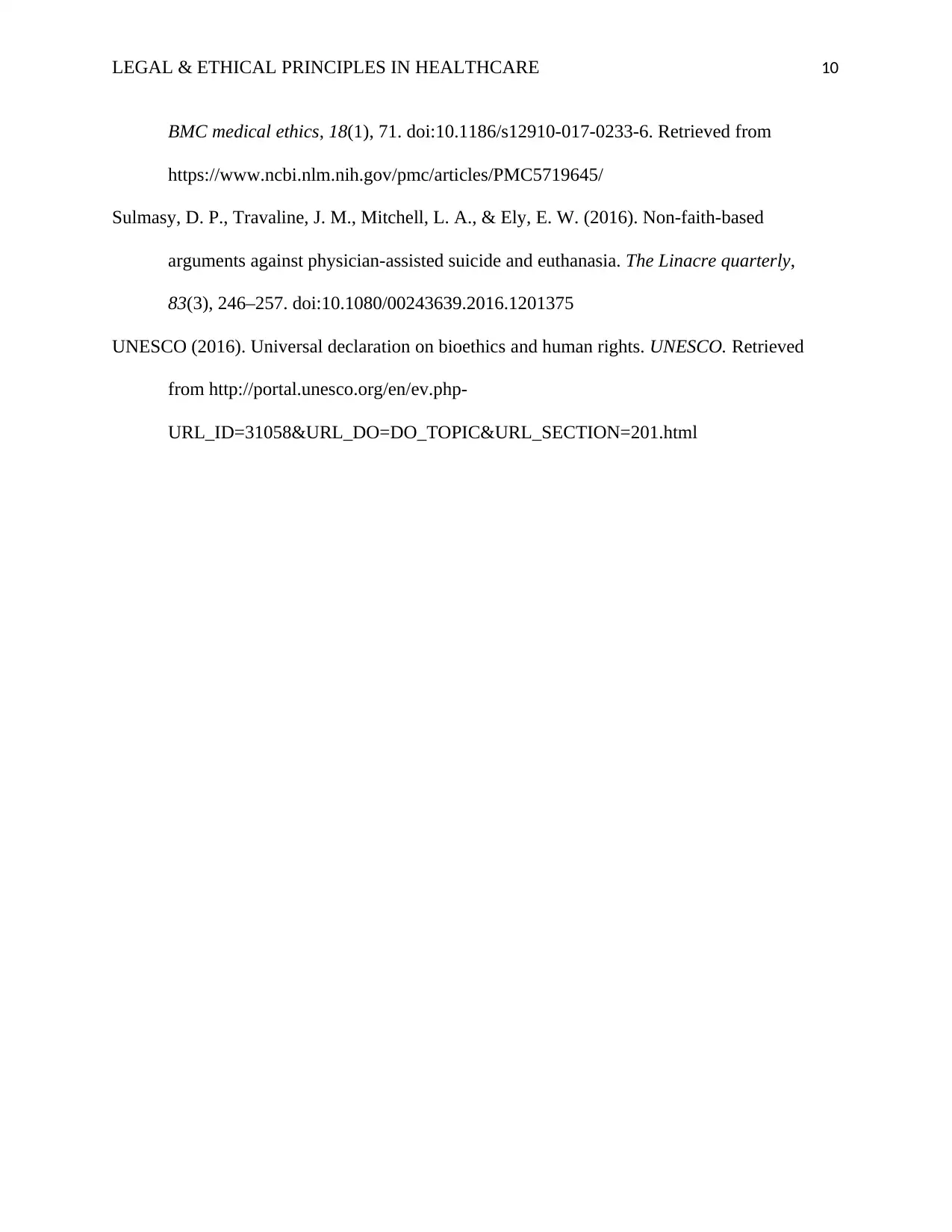
LEGAL & ETHICAL PRINCIPLES IN HEALTHCARE 10
BMC medical ethics, 18(1), 71. doi:10.1186/s12910-017-0233-6. Retrieved from
https://www.ncbi.nlm.nih.gov/pmc/articles/PMC5719645/
Sulmasy, D. P., Travaline, J. M., Mitchell, L. A., & Ely, E. W. (2016). Non-faith-based
arguments against physician-assisted suicide and euthanasia. The Linacre quarterly,
83(3), 246–257. doi:10.1080/00243639.2016.1201375
UNESCO (2016). Universal declaration on bioethics and human rights. UNESCO. Retrieved
from http://portal.unesco.org/en/ev.php-
URL_ID=31058&URL_DO=DO_TOPIC&URL_SECTION=201.html
BMC medical ethics, 18(1), 71. doi:10.1186/s12910-017-0233-6. Retrieved from
https://www.ncbi.nlm.nih.gov/pmc/articles/PMC5719645/
Sulmasy, D. P., Travaline, J. M., Mitchell, L. A., & Ely, E. W. (2016). Non-faith-based
arguments against physician-assisted suicide and euthanasia. The Linacre quarterly,
83(3), 246–257. doi:10.1080/00243639.2016.1201375
UNESCO (2016). Universal declaration on bioethics and human rights. UNESCO. Retrieved
from http://portal.unesco.org/en/ev.php-
URL_ID=31058&URL_DO=DO_TOPIC&URL_SECTION=201.html
1 out of 11
Related Documents
Your All-in-One AI-Powered Toolkit for Academic Success.
+13062052269
info@desklib.com
Available 24*7 on WhatsApp / Email
![[object Object]](/_next/static/media/star-bottom.7253800d.svg)
Unlock your academic potential
Copyright © 2020–2026 A2Z Services. All Rights Reserved. Developed and managed by ZUCOL.





